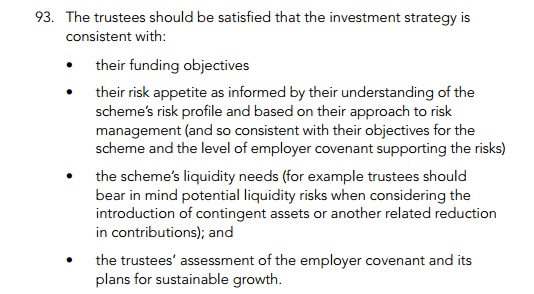The Pensions Regulator has today released a defined benefit code of practice that emphasises the importance of trustees and employers working together as a big happy family.
The regulator said the code urges trustees and employers to consider the impact scheme funding proposals may have on the employer’s plans for sustainable business growth.
In a statement, Stephen Soper, interim chief executive at the regulator, said: “In the vast majority of circumstances, trustees and employers should be able to agree funding plans that both benefit the business and strengthen the scheme’s long-term security – but this can only be achieved by employers and trustees working openly and collaboratively.”
Trustees will now be expected to take an integrated approach to risk management. “Trustees should take into account their views on market conditions and the outlook for future asset returns and the associated uncertainty of those returns and what this means for their scheme and employer(s),” the code stated.
This is expected to be in place by their 2014 valuations.
The regulator said the code urges trustees and employers to consider the impact scheme funding proposals may have on the employer’s plans for sustainable business growth, and give members security:
The code will help trustees & employers of DB schemes to agree funding plans to give security for retirement savings http://t.co/KTo9faMTnB
— ThePensionsRegulator (@TPRgovuk) June 10, 2014In a statement, Stephen Soper, interim chief executive at the regulator, said: “In the vast majority of circumstances, trustees and employers should be able to agree funding plans that both benefit the business and strengthen the scheme’s long-term security – but this can only be achieved by employers and trustees working openly and collaboratively.”
The immediate industry reaction was not one of surprise at the contents:
Additional flexibility but with this comes the requirement for a transparent & integrated approach to risk mngment #DB#pension#TPR
— Marian Elliott (@marianelliott) June 10, 2014As for the Code - no sign of the Balanced Funding Outcome #BFO at a quick glance. Sensible content, but business as usual #TPR#Pensions
— Simon Kew (@PensionsJackal) June 10, 2014Mike Smedley, pensions partner at consultancy KPMG, gave the following press statement: “To illustrate the change in tone, parts of the regulator’s old guidance stated that deficits should be met 'as quickly as reasonably affordable'. But now, deficit recovery plans should be 'appropriately tailored to the scheme and employers’ circumstances'.
"Consequently, a strong employer will no longer be under pressure to meet a deficit very quickly at the expense of investment in the business."
Risk management
Trustees will now be expected to take an integrated approach to risk management. “Trustees should take into account their views on market conditions and the outlook for future asset returns and the associated uncertainty of those returns and what this means for their scheme and employer(s),” the code stated.
This is expected to be in place by their 2014 valuations.

Source: The Pensions Regulator
Investment strategy
Trustees will also be expected to place investment strategies that are appropriate to the scheme and employer's situation.

Source: The Pensions Regulator
The regulator also highlighted the need for diversification in investments and that trustees should have "sufficient and appropriate knowledge and understanding to enable them to provide sound and prudent oversight of the investment strategy".
In a world of negative rates and continuing low yields, the difficulty will still rest with deciding what an appropriate investment strategy looks like.

















